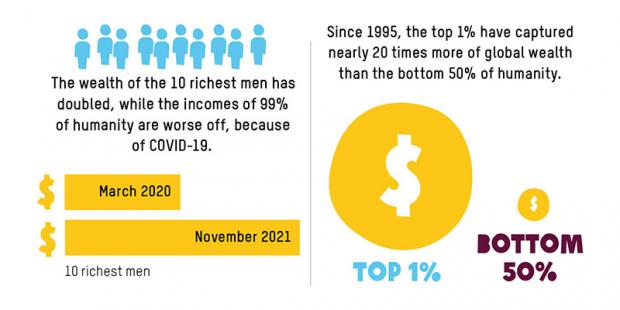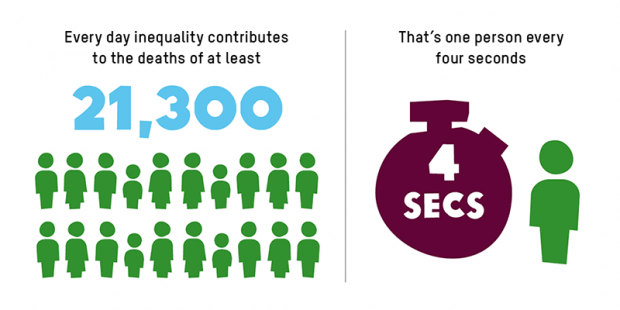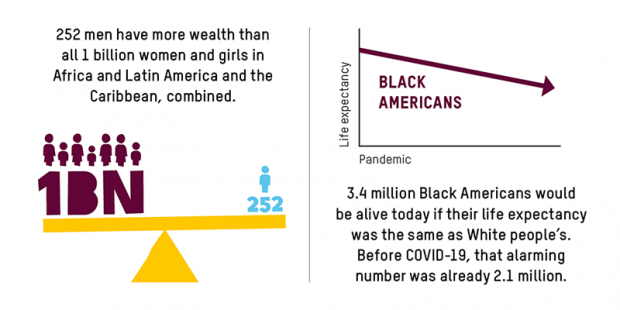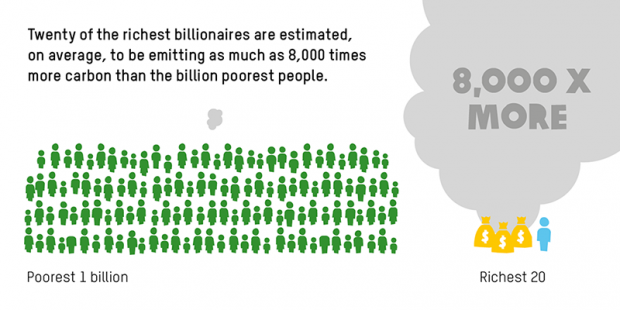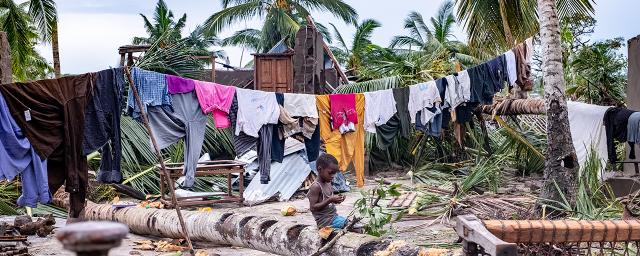
A boy sits amid scenes of destruction in Macomia town after it was hit by tropical cyclone Kenneth, which made landfall in Cabo Delgado province in Northern Mozambique, on 25th April 2019. Photo: Tommy Trenchard/Oxfam
Here’s a hard truth that the Covid-19 pandemic brought home to us. Inequality does not only create immense suffering: it contributes to the death of 1 person every 4 seconds.
Over the past two years, people have died when they contracted an infectious disease because they did not get vaccines in time. They have died of other illnesses because they could not afford private care. They have died of hunger because they could not afford to buy food. Women have died due to gender-based violence.
And while they died, the richest people in the world got richer than ever and some of the largest companies made unprecedented profits.
Inequality is not an abstract issue. It has devastating, real-world consequences. It has made the Covid-19 pandemic deadlier, more prolonged and more damaging. It is rigged into our economic systems and is tearing our societies apart.
This reality is not by chance, but by choice. The solutions are within our grasp.
Alarming trends: how Covid-19 created an inequality explosion
1. The biggest surge in billionaire wealth ever
The world’s small elite of 2,755 billionaires has seen its fortunes grow more during Covid-19 than they have in the whole of the last fourteen years combined. This is the biggest annual increase since records began. It is taking place on every continent. It is enabled by skyrocketing stock market prices, a boom in unregulated entities, a surge in monopoly power and privatization, alongside the erosion of individual corporate tax rates and workers' rights and wages. Since the pandemic began, a new billionaire has been created every 26 hours.
2. The cost of inequality is in human lives
Inequality is deadly. We estimate that it contributes to the deaths of at least 21,300 people each day—or one person every four seconds. This is a highly conservative estimate for deaths resulting from hunger, lack of access to healthcare and climate breakdown in poor countries, as well as gender-based violence faced by women and rooted in patriarchy and sexist economic systems. Millions of people would still be alive today if they had had a Covid-19 vaccine—but they were denied a chance while big pharmaceutical corporations continue to hold monopoly control of these technologies.
3. The Covid-19 pandemic feeds on inequality
Inequality disproportionately affects the vast majority of people living in poverty, women and girls, and racialized and marginalized groups. It is now prolonging the course of the Covid-19 pandemic, which has led to a sharp increase in poverty around the world. More than 80% of the vaccines have gone to G20 countries, while less than 1% have reached low-income countries. This vaccine apartheid is taking lives, and it is supercharging inequalities worldwide. In some countries, the poorest people are nearly four times more likely to die from Covid-19 as the richest.
4. Inequality causes direct harm to us all
Inequality is deadly for the future of our world. The extreme concentration of money, power, and influence of a few at the very top has pernicious effects on the rest of us. We all suffer from a heating planet when rich countries fail to address the effects of their responsibility for an estimated 92% of all excess historic emissions. We all lose out when the world’s wealthiest 1% use double the carbon emissions of the bottom 50%, or when a few powerful corporations are able to monopolize production over life-saving vaccines and treatments in a global pandemic.
5. Inequality isn’t by chance, but by choice
An extreme boom in billionaire wealth is not a sign of a healthy economy, but the result of a profoundly harmful and violent economic system. That people in poverty, women and girls, and racialized groups are so often disproportionately killed or harmed, more than those who are rich and privileged, is not an accident. Extreme inequality is a form of economic violence that is perpetrated when structural and systemic policy choices are made for the richest and most powerful people. This causes direct harm to us all, and to the poorest people, women and girls, and racialized groups most. Here are four examples of economic violence at work:
The secret is out: governments can act
Governments have huge scope to radically change course. And they have a choice. They can choose a violent, sexist and racist economy in which billionaire wealth booms, in which millions of people are harmed or killed, and billions of people are impoverished due to inequality; in which we burn the planet and our future human existence.
Or they can choose an economy centered on equality, in which nobody lives in poverty, and neither does anyone live with unimaginable billionaire wealth; in which there is freedom from want; in which more than just survive, everyone has the chance to thrive—and to hope; in which inequality no longer kills.
That choice is the choice facing this generation, and it must be made now.
